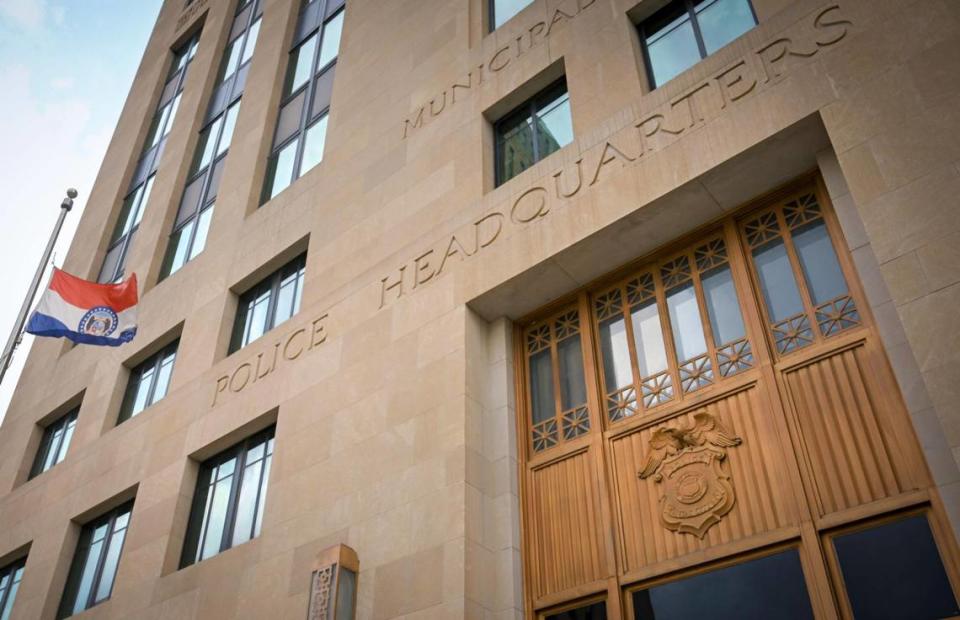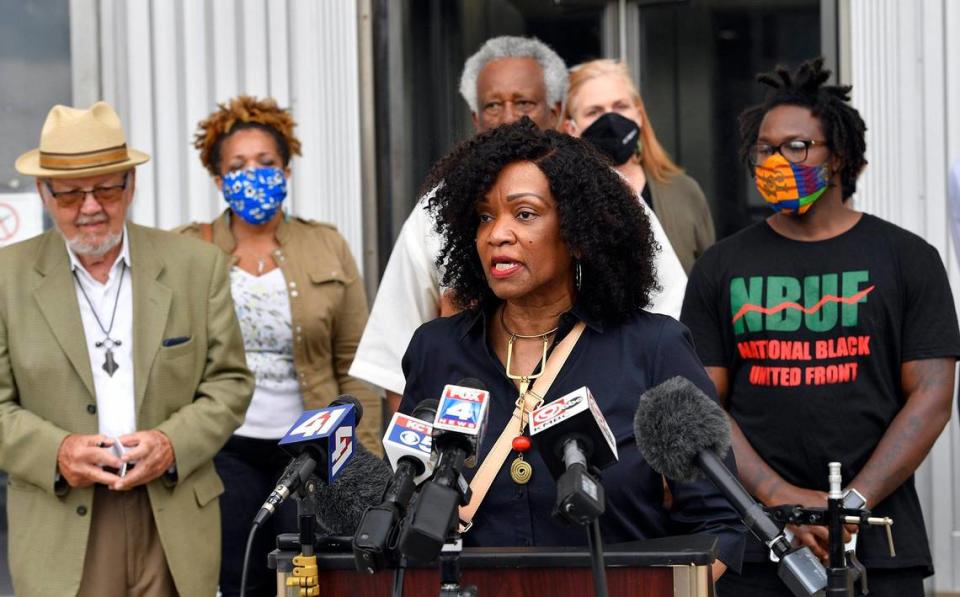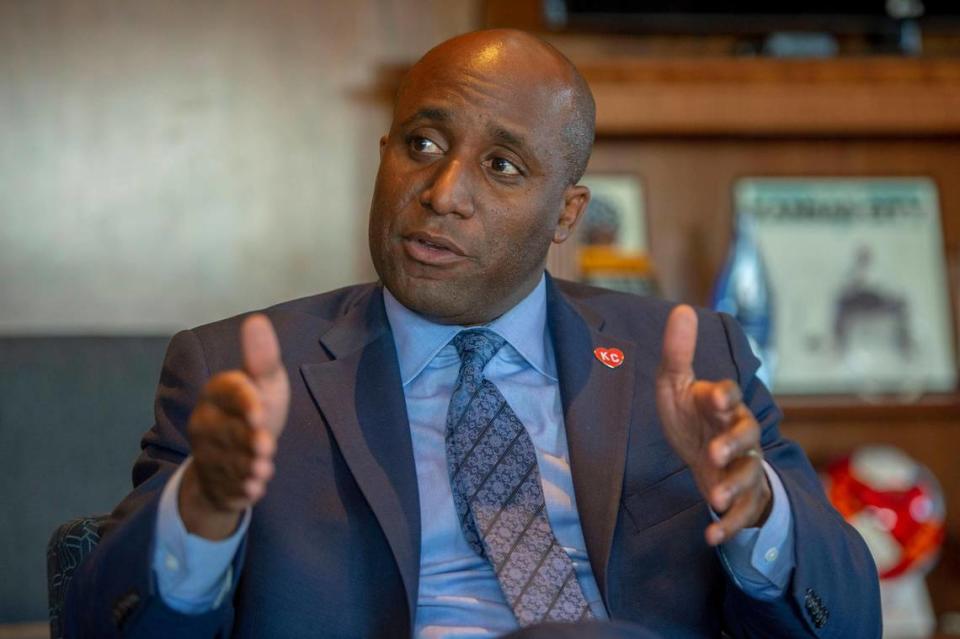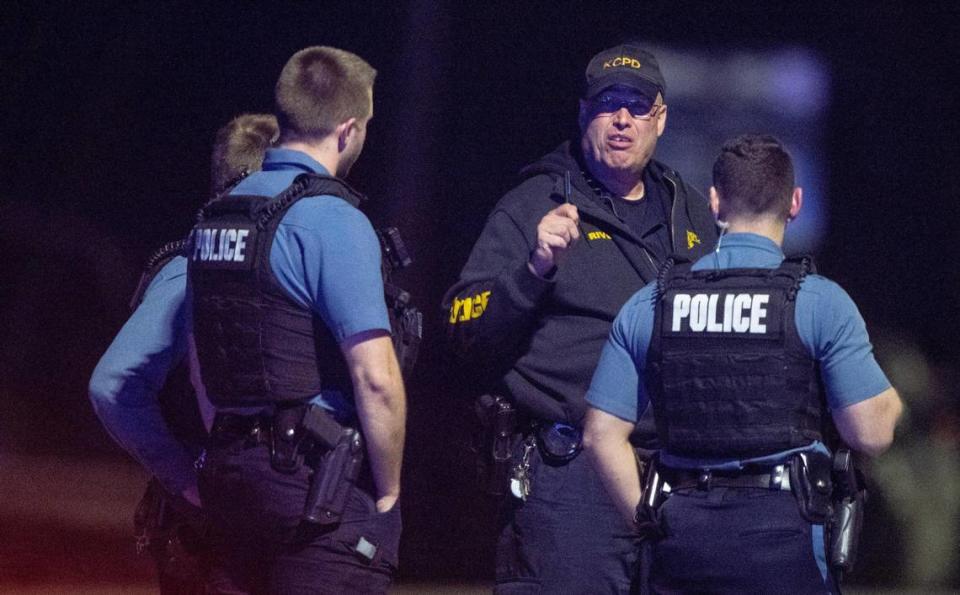How much tax money is Kansas City required to give police? KCPD argues for millions more
- Oops!Something went wrong.Please try again later.
In less than 10 years, Kansas City has increased the money it gives the police department by $56 million, totaling $284 million this year.
But the police department argues it may be entitled to millions more — maybe even hundreds of millions more.
“I think they believe that they’re entitled to anything that may go through the coffers or checkbook of the city of Kansas City,” Mayor Quinton Lucas said. “I mean, it’s an astonishing and very sweeping argument.”
The police department, which is overseen by the Board of Police Commissioners, raises the possibility that it could be owed more money in a counterclaim to lawsuits filed by Lucas and Gwen Grant, the president and CEO of the Urban League of Greater Kansas City.
Those lawsuits concern both the unique governance of the department and how it is funded.

The relationship between the city and police department is a complicated, often contentious one. The Kansas City Board of Police Commissioners oversees the department, and four of its five members are appointed by the governor.
Missouri law currently requires Kansas City to allocate 25% from its general revenue fund to the department. Missouri voters passed a constitutional amendment in November increasing the allocation from 20%.
But the police board argues that the city is undercounting its general revenues and thus depriving the police department of funding. The board specifically targeted local economic development incentives, arguing the department may be entitled to a quarter of those funds.
Some of that incentive money never even reaches City Hall coffers. Property tax breaks awarded to developers, for instance, don’t represent actual dollars flowing into the city, but the board argues it is entitled to its share of those funds.
“Excluding development incentives and economic development activity from the City’s general revenue is especially problematic because those activities increase the cost of policing,” the board’s counterclaim reads, referring to new developments like shopping or entertainment districts.
Targeting development incentives is noteworthy on its own. But the police board’s argument is so sweeping that it raises questions about other city funds like federal grant programs or even the self-funded water and aviation departments.
By the police board’s logic, Lucas said the agency could be entitled to some $500 million — $220 million above the police department’s 2023 budget.
If the courts rule in favor of the police, Lucas says that decision could cost the city hundreds of millions. It could lead to layoffs in other city departments like public works and even push the city toward bankruptcy, he said.
A lawyer representing the police board says the organization is just seeking clarity in how the city determines police funding.
“This is a question that came up only because the mayor sued the board,” said Pat McInerney, a former police board president who is now representing the board as a private attorney.
Legal questions over funding
Since 1939, the Kansas City police force has been under state control. The Missouri governor appoints four members of the five-member commission. The fifth seat is occupied by the mayor.
While the city funds the police department, it has no say in how its millions of dollars are spent.
In its filing, the police board cites a 1955 decision from the Missouri Supreme Court that found the city cannot earmark funds for special purposes just to prevent them from being dispersed to the state-controlled police department.
In her 2021 lawsuit, Grant alleges that the state control of the city’s police department is discriminatory and prevents Kansas City residents from having a voice in how millions of tax dollars are spent in their city.
Grant said the lawsuit was filed on behalf of Kansas City’s taxpayers because the current police system represents “taxation without representation” and violates the Missouri Hancock Amendment, a 1980 constitutional amendment that limits tax increases and the amount of personal income used to fund state government.

It also violates the Equal Protection Clause of the U.S. Constitution, she argued, because it was implemented for discriminatory purposes and has a discriminatory impact on Missouri’s Black population.
Lucas filed a lawsuit in August in which he contends the new state law that requires Kansas City to spend more on its police force violates a provision in the Missouri Constitution that restricts the legislature from passing unfunded mandates to local governments.
In legal filings, Lucas says the law would force Kansas City to cut funding from other government services like its fire department, road repairs and parks.
The two cases were consolidated at the police board’s request. In its filing, attorneys for the police board said the legal action by Grant and Lucas were “identical claims in two divisions, giving them two bites at the apple on their Hancock claims, muddying the appellate record, and exposing the Board to inconsistent judgments.”
“None of Ms. Grant’s or the City’s arguments for prosecuting the same claims in two different courtrooms make sense.”
The lawsuits are still ongoing, though Grant agreed to a $250,000 settlement with the city. Those funds would pay for her legal fees associated with her legal action, according to court records.
“She eagerly awaits trial of her claims, and looks forward to the day when Kansas City regains control of its police,” said Jon Dedon, Grant’s attorney.
The police board says the mayor has greatly exaggerated the gravity of the claims made in court.
McInerney said the police board simply wants to know how the city determines what funds the police are entitled to.
“Quite frankly, it’s a little bit surprising everybody is up in arms about having to answer that fairly straightforward question,” he said.
Even if the courts find the board is owed more money, McInerney said it doesn’t mean the police department would need all those funds. Its budget would still be dictated by how much money is needed on an annual basis.
“This is not the police board aiming for anybody’s money,” McInerney said. “This is looking to have a transparent, calm conversation and make a decision about how much money is involved here.”
City budget faces challenges
Like many local governments, Kansas City slices its annual budget into various funds. The biggest and most important is the general fund.
In Kansas City, that pot of money pays for police and fire protection, along with housing and neighborhood services. In the recently approved 2023-2024 budget, the general fund accounts for 30% of the city’s $2.06 billion spending plan.
But the general fund is facing a structural imbalance — meaning costs are rising much faster than revenues. City officials already project the need to drain more than $100 million from the general fund balance, a reserve account, over the next few years.
A ruling that favors the police board’s legal argument would exacerbate those existing budget pressures, Lucas said, and potentially force drastic cuts in other departments.
“That means that we need to trim the fat somewhere and where we can never trim the fat is in the police department, per their argument,” the mayor said. “And so this will pit the police department against public works. It will pit the police department against the fire department. It will pit the police department against basic core infrastructure investment, and it will pit the police department against the city of Kansas City once more.”

The police board noted in its filing that it and the city had previously “worked collaboratively to adequately fund the police department” based on its stated needs. And generally, the City Council has voluntarily funded the police department at rates higher than required by state law.
The police board says the city has at times provided its figures for “general revenue,” but never offered details on how it is calculated.
“...The City has never provided the Board with any explanation, description, or other narrative describing how the City makes its calculation, what is included, and most importantly what revenue amounts it excludes from the final calculation,” the filing says. “In other words, the City has never ‘shown its work’ to the Board.”
The police board argues that the city is violating state law by employing “accounting gimmicks” like earmarking certain funds and excluding them from their general revenue calculation.
But some of the funds it targets aren’t actually city revenue.
Take Community Improvement Districts, special entities that collect specific sales, use or property taxes in a distinct area.
While the city has set up a number of these special tax districts, it does not necessarily oversee the distribution of these funds. That job is left to volunteer boards.
Board members of the Independence Avenue CID direct that district’s funds toward private security, landscaping and beautification efforts in the Historic Northeast. Similarly, special sales taxes collected downtown and in the River Market fund cleanup efforts, graffiti removal and extra security.

“No one knows how exactly you would collect all of these items,” Lucas said, “particularly because the city doesn’t actually in many cases do its own revenue collections.”
But in legal filings, the police board says excluding those items out of its calculation are “starving the police department” of funds.
In an email to developers and development attorneys, the mayor said the lawsuit, if successful, could have a “substantial chilling effect on all development” in Kansas City.
“The interesting thing is while generations of anti-tax incentive and abatement advocates have tried hard to abolish incentives, the board of police commissioners and the lawyers at Spencer Fane are likely to be the most productive people ever in eliminating economic development and incentives in Kansas City,” Lucas told The Star referring to the law firm representing the police board.
What would department do with extra money?
If the police board wins the case, it’s unclear how it would spend its newfound windfall.
In an email to The Star, Police Chief Stacey Graves said: “Our practice every year is to submit our requested budget to the board for approval outlining the things we need to keep Kansas City safe, and the costs associated with those needs. That practice will not change.”
For years, the police department and its board of commissioners have struggled to foster a working relationship with community activists and neighborhood leaders.
They frequently criticize the board for not holding police leadership accountable when police officers are accused of excessive use of force, the killings of Black men, being indifferent to the claims of missing Black women and the city’s alarmingly high rate of unsolved nonfatal shootings and homicides.

Lora McDonald, the executive director of Metro Organization for Racial and Economic Equity or MORE2, said the ongoing court battle initiated by the board to get more police funding is an example of the divide that exists between the two sides.
“The assertion they are making in this lawsuit is the most outlandish claim I have ever heard and the ramifications would create a city-wide budgetary landslide,” McDonald said. “The suggestion that they should be able to get 25% of other forms of revenue is outlandish, irresponsible, arrogant and dangerous.”
Kansas City Councilwoman Katheryn Shields said the city provides the police department with ample funding. The department also receives additional money, including a public safety quarter-cent sales tax as well as other funding sources.
“What we’ve been doing is very generous and of course, the bottom line becomes what are we — whether it’s 20% or 25% — what are we getting for our money,” Shields said.
“They don’t respond to accidents unless there is an injury involved and an ambulance is called. They don’t solve murders. They don’t solve burglaries.”
Shields said she questions the logic of the court forcing the city to give police 25% of money it receives from specific uses like water and sewage payments. That could adversely affect the city’s overall revenue stream, she said.
“I mean, they’re getting easily over $300 million,” Shields said. “And they tell us they can’t afford to have an academy class because they don’t have enough money to police. I mean, it’s ludicrous.”
In recent years, the department said it eliminated a class of police officer cadets at its police academy because of the lack of funding. In 2021, then-Police Chief Rick Smith said budget cuts imposed by city leaders due to the coronavirus pandemic forced him to freeze all law enforcement and civilian pay in 2020 and during the first quarter of 2021.
Smith also threatened to eliminate police outreach programs such as the Police Athletic League and the Drug Abuse Resistance Education, or D.A.R.E., if additional money was not available.
Since then, the City Council has allocated additional funding for an academy class and pay raises for all department employees. It also provided more money for a number of equipment upgrades and to hire 911 call takers and dispatchers.
Generally, city departments project upcoming expenses and needs when crafting budget requests. But Lucas said the police board seems to be seeking as much money as possible — even if it may not be needed.
“The police board has actually taken a position that we just want the money,” he said. “We don’t know what our expenses will actually be in a given year. We don’t know if costs will go up. We don’t know if we’re buying new equipment. We’re just saying we want it all.”

